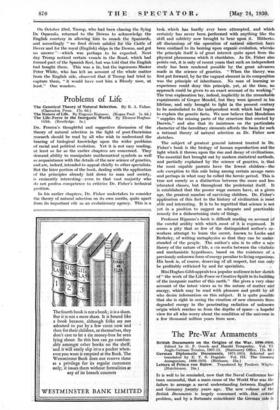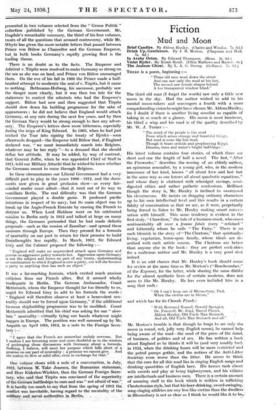The Pre-War Armaments
British Documents on the Origins of the War, 1898-1914. Edited by G. P. Gooch and Harold Temperley. Vol. VI. Anglo-German Tension, 1907-12. (Stationery Office. 17s. 6c1.) German Diplomatic Documents, 1871-1914. Selected and translated by E. T. S. Dugdale. Vol. III. The Growing Antagonism, 1898-1910. (Methuen. 21s.) Letters of Prince von Billow. Translated by Frederic Whyte. (Hutchinson. 24s.) Letters of Prince von Billow. Translated by Frederic Whyte. (Hutchinson. 24s.)
•
IT is well to be reminded, now that the Naval Conference has been successful, that a main cause of the World War was the failure . to arrange a naval understanding between England and Germany twenty years ago.. The new volume of the British Documents is largely concerned with , this critical problem, and by a fortunate coincidente the German side is
presented in two volumes selected from the " Grosse Politik " collection published by the German • Government. Mr.
Dugdale's remarkable summary, the third of his four volumes, treats of all the questions that aroused controversy, while Mr. Whyte has given the- More"riotable letters that passed between Prince von Billow as Chancellor and the German Emperor,
but in both books Germany's rapidly growing fleet is the leading theme.
There is no doubt as to the facts. The Emperor and AdMiral v. Tirpitz were resolved to make Germany as strong on the-sea as she was on land, and Prince von Billow encouraged
them. On the eve of his in 1909 the Prince made a half- hearted attempt to moderate the zeal of v. Tirpitz, but it came to nothing. Bethniann-Hollweg, his successor, probably saw the danger more clearly, but it was then -too late for the statesmen to control the admirals who had the Emperor's support. Billow had now and then suggested that Tirpitz should slow down his building programme for the sake of appearances ; he did not believe that England would attack Gerfnany, at any rate during the next few years, and by then' the German Navy would be strong enough to face any adver-
sary. The Emperor's letters show more bitterness, especially during the reign of King Edward. In 1905; when he had juste
tricked the Tsar into signing the treaty of Bjerko—soon afterwards dropped—the Emperor told Billow that, if England declared war, " we must immediately march into Belgium, whatever may be her reply "—to a demand that she should defirie her attitude. It may be added, by way of contrast,' that General Joffre, when he was appointed Chief of Staff in 194, told our Military Attache that he wished he knew whether the: Germans meant to come through Belgium.
in these circumstances our Liberal Government had a very . difficult part to play in the years 1906-1912, and the docu-: meats now given in great profusion show—as every fair-. minded reader must admit—that it went out of its way to - conefliate Berlin. The real difficulty was that the German. Government. played a double game. It professed pacific
intentions in respect of its navy, but its main object was to break up the Anglo-French Entente by causing the French to distrust us. When Lord Haldane went on his celebrated' mission to Berlin early in 1912 and talked at large on many things, the Germans pretended that he had made definite proposals—such as the cession of Zanzibar—and spread these rumours through Europe. - Then they pressed for a formula of neutrality on our part in return for their promise to build Dreadnoughts less rapidly. In March, 1912, Sir Edward Grey: and the Cabinet proposed the following :—
" England will make no unprovoked attack upon Germany and pursue no aggressive policy towards her. Aggression upon Germany is not the subject and forms no part of. any treaty, understanding or combination to which England is now a party, nor will she become a party to anything that has such an object."
It was a far-reaching formula, which excited much anxious criticism from Our French allies. But it seemed wholly. inadequate in Berlin. The German Ambassador, Count, Metternich, whom the Emperor thought far too friendly to us,, urged Sir Edward Grey to add to his formula the words " England will therefore observe at least a benevolent neu-.
trality should war be forced upon Germany," if the additional' German shipbuilding progranirrie was to be modified. Count. Metternich admitted that his chief was asking for our." abso-
lute" neutrality-virtually tying our hands whatever might happen in Europe. The position was well summed up by Mr.
Asquith on April 10th, 1912, in a note to the Foreign Secre- tary
", I agree that. the French are somewhat unduly nervous. But I confess I am becoming more and more doubtful as to the wisdom. of prolonging these discussions with Germany about a formula. Nothing, I believe, will meet her purpose which falls short of a promise on our part of neutrality : a promise we cannot give. And she, makes no firm or solid offer, even in exchange for that."
One volume' closes with a note of a conversation, in July, • 1912, between M. Take Jonescu, the Rumanian statesman,: and Herr Kiderlen-Wilchter, then the German Foreign Secre- tary, who said -that Tirpitz was convinced of the superiority- of the German battleships to ours and was " not afraid of war."
It. is hardly too much to say that from the spring of 1912 the conflict was inevitable, having regard to the mentality of the
military- and naval authorities in Berlin.







































 Previous page
Previous page